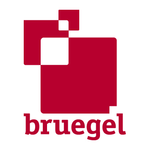Bruegel (institution)
| Bruegel | |
|---|---|
 | |
| Established | 2005 |
| Focus | International economics |
| Chairman | Jean Claude Trichet |
| Director | Guntram Wolff |
| Staff | 30 |
| Location | Brussels, Belgium |
| Address | Rue de la Charité/Liefdadigheidsstraat 33 |
| Website | www.bruegel.org |
Bruegel is a think tank devoted to policy research on international economic issues, based in Brussels. It started operations in 2005[1] and has rapidly risen to prominence, having been ranked first worldwide among all think tanks in international economic policy in 2012.[2] Prospect Magazine also named it European and global think tank of the year in 2011.[3]
Bruegel has a unique governance and funding model based on memberships from Member States of the European Union, international corporations, and other institutions.
Organisation
Bruegel relies on a core team of resident and non-resident economic scholars and a team of operational staff. The current resident research team is composed of:
- Guntram Wolff, Director
- Zsolt Darvas, Senior Fellow
- Mario Mariniello, Research Fellow
- André Sapir, Senior Fellow
- Reinhilde Veugelers, Senior Fellow
- Nicolas Véron, Senior Fellow (also at the Peterson Institute for International Economics)
- Georg Zachmann, Research Fellow
Bruegel also relies on Visiting and Non-Resident Fellows, among which Philippe Aghion, Alan Ahearne, Jürgen von Hagen, Bruno van Pottelsberghe, Francesco Papadia, and Jörg Rocholl.
Membership and funding
Bruegel is supported by a wide array of members which contribute the bulk of its financial resources. The majority of its resources comes from state and corporate members.
State members are Member States of the European Union, on a voluntary basis. They currently include 19 EU countries, including all the largest ones: Austria, Belgium, Cyprus, Denmark, Finland, France, Germany, Greece, Hungary, Ireland, Italy, Lithuania, Luxembourg, the Netherlands, Poland, Slovakia, Slovenia, Sweden, Spain, and the United Kingdom. They are represented by relevant government departments, which typically include Finance Ministries.
Corporate members are international corporations and firms, most of which (but far from all) are headquartered in the European Union. Bruegel is also supported by a number of public organizations (national central banks and public financial institutions), known as its Institutional Members.
Bruegel has been recognized from its outset as setting a new standard in terms of financial transparency.[4] The full list of sponsors is updated on Bruegel's website, and individual financial contributions are detailed in Bruegel's Annual Reports which are also available online.
Board
The board is Bruegel's central governance body and decides on strategy and on Bruegel's research agenda. It also appoints the director and deputy director and oversees Bruegel's financial management and budget. However, the Board does not bear responsibility for research results‚ which remains with individual researchers under the editorial oversight of the Director.
The board is elected for a three-year term by Bruegel's members and consists of 11 individuals with backgrounds in government, business, academia and civil society. The current Board membership consists of: Jean-Claude Trichet (Chairman), José Manuel Campa, Anna Ekström, Jan Fischer, Vittorio Grilli, Wolfgang Kopf, Jim O'Neill, Lars-Hendrik Röller, Dariusz Rosati, and Helen Wallace.
Scientific council and evaluation
Bruegel's scientific council advises it and its board on future research needs and provides ex post feedback and evaluation on Bruegel's research. It consists of eight individuals recognised internationally in the academic world. Its current members are Giuseppe Bertola (Chair), Sergei Guriev, Peter Neary, Lucrezia Reichlin, Dani Rodrik, Paul Seabright, Jaume Ventura, and Luigi Zingales.
A review of the impact and relevance of Bruegel's activities covering the period 2007-09 was released in 2010 by an independent review task force chaired by Ieke van den Burg.[5]
History
Bruegel's original concept stemmed from private discussions involving policy-makers, business leaders and other individuals from several European countries in late 2002. The project was endorsed and officially floated by French President Jacques Chirac and German Chancellor Gerhard Schröder at the 40th anniversary of the Elysée Treaty in January 2003. Former European Commissioner Mario Monti and economists Jean Pisani-Ferry and Nicolas Véron were instrumental in Bruegel's creation. Bruegel was legally formed in August 2004 and started operations in early 2005.[6]
The board was successively chaired by Mario Monti, who remains Bruegel's honorary president (2005–08); Leszek Balcerowicz (2008-12); and Jean Claude Trichet (since April 2012).[7] Jean Pisani-Ferry was director from January 2005 to April 2013.
Bruegel moved to its current premises, on Rue de la Charité / Liefdadigheidsstraat 33 in central Brussels, in April 2005.
Bruegel explains its name as a tribute to Pieter Bruegel, the 16th-century painter whose work epitomizes unvarnished and innovative depictions of life in Europe. It can also be read as a reference to a "Brussels European and Global Economic Laboratory", even though Bruegel does not consider its name to be an acronym.
References
- ↑ "European think tanks and the EU". Berlaymont paper (2). September 2012. Retrieved 21 September 2013.
- ↑ James McGann (January 2013). "The Global Go To Think Tanks Report 2012".
- ↑ "Think Tank of the Year Awards 2012". July 2012.
- ↑ "Brussels think tanks persist in funding secrecy". Corporate Europe Observatory. December 2006.
- ↑ Bruegel Review Task Force (June 2010). "Bruegel at 5: Review of quality, relevance and impact of Bruegel’s activities 2007–2009".
- ↑ "Bruegel: newest addition to think tank landscape in Brussels". Euractiv. 19 January 2005.
- ↑ Ian Wishart (4 April 2012). "Trichet named head of think-tank". European Voice.